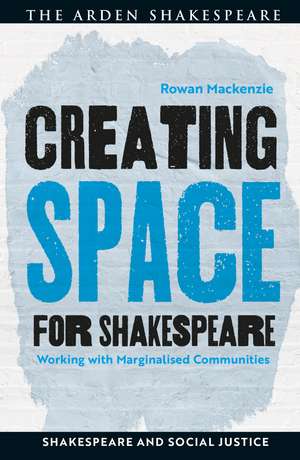Creating Space for Shakespeare: Working with Marginalized Communities: Shakespeare and Social Justice
Autor Rowan Mackenzie Dr David Ruiter, Matthieu Chapmanen Limba Engleză Hardback – 8 mar 2023
| Toate formatele și edițiile | Preț | Express |
|---|---|---|
| Paperback (1) | 191.04 lei 3-5 săpt. | |
| Bloomsbury Publishing – 18 sep 2024 | 191.04 lei 3-5 săpt. | |
| Hardback (1) | 497.22 lei 6-8 săpt. | |
| Bloomsbury Publishing – 8 mar 2023 | 497.22 lei 6-8 săpt. |
Preț: 497.22 lei
Preț vechi: 688.39 lei
-28% Nou
Puncte Express: 746
Preț estimativ în valută:
95.15€ • 103.32$ • 79.93£
95.15€ • 103.32$ • 79.93£
Carte tipărită la comandă
Livrare economică 22 aprilie-06 mai
Preluare comenzi: 021 569.72.76
Specificații
ISBN-13: 9781350272651
ISBN-10: 1350272655
Pagini: 280
Ilustrații: 25 bw illus
Dimensiuni: 138 x 216 x 22 mm
Greutate: 0.46 kg
Editura: Bloomsbury Publishing
Colecția The Arden Shakespeare
Seria Shakespeare and Social Justice
Locul publicării:London, United Kingdom
ISBN-10: 1350272655
Pagini: 280
Ilustrații: 25 bw illus
Dimensiuni: 138 x 216 x 22 mm
Greutate: 0.46 kg
Editura: Bloomsbury Publishing
Colecția The Arden Shakespeare
Seria Shakespeare and Social Justice
Locul publicării:London, United Kingdom
Caracteristici
Explores a range of projects, including the first two collaborative theatre companies within English prisons to be co-owned between the author and those incarcerated, and including detailed accounts from the perspectives of the actors and others involved
Notă biografică
Rowan Mackenzie is founder of Shakespeare UnBard and Artistic Director of three permanent, collaborative, in-prison theatre companies. She has a PhD from the Shakespeare Institute, University of Birmingham, UK. She has received a number of prestigious awards for her work, including Shakespeare Association of America Public Shakespeare Award 2021, Butler Trust Commendation 2021, Worshipful Company of Educators Inspirational Educator Award for Teaching Shakespeare 2020, Prisoner Learning Alliance Outstanding Individual Award 2019.
Cuprins
List of IllustrationsIntroductionSocial justice and Social InjusticesCreative SpacesPerformance SpacesReflective SpacesMediated SpacesChapter 1 - The Need to Break Down SilosLearning DisabilitiesMental Health IssuesCriminal Justice SystemHomelessnessChapter 2 - Creative SpacesShort-term ProjectsMedium-term ProjectsLong-term ProjectsConclusionsChapter 3 - Performative SpacesDemarcated SpacesAppropriated SpacesConclusionsChapter 4 - Reflective SpacesIndividual ReflectionsReflections on Group DynamicsConclusionsChapter 5 - Mediated SpacesJournalismDocumentariesLow Budget MediaWritten MediaConclusionsConclusionReferencesIndex
Recenzii
Creating Space for Shakespeare offers a vivid, clear-sighted, praxis-oriented account of what has been termed 'applied Shakespeare' - projects which harness the Shakespeare canon and its cultural capital to a range of benign social purposes. While some Shakespearean scholars limit themselves to trying to speak with the dead, Mackenzie shows how the plays can enable us to speak with hitherto excluded categories of the living.
What place can Shakespeare have for the most vulnerable sections of our society? If your answer is that he stands only for an imposed high culture, Rowan Mackenzie's remarkable and deeply moving account of the part his plays can occupy in a wide range of kinds of marginalized communities will make you think again. This compassionate survey of her own work and that of many others redefines what Shakespeare means in 21st century Britain.
Rowan Mackenzie has written a remarkable book, made even more so by her thorough academic research combined with an accessible approach. We are taken on a creative journey through several prison institutions, each unique in their own way, as are the inhabitants, individuals who embark on their own creative journey. Too often attitudes prevail that such populations do not deserve Shakespeare, let alone drama. However the drama holds the very key to change, and Shakespeare a very specific form of drama to facilitate this change. The hard hitting challenges and the profound insights are all the result of applied Shakespeare. Rowan writes with understanding and compassion and her love of her work is constantly demonstrated. We are there in the workshop or performance, witnessing these remarkable events! This book should be read by dramatherapists and all arts and creative arts therapists, educators and clinicians who work in associated forensic fields. Ideally it should be recommended as a model for both practice and research, in prevention as well as rehabilitation. It is a gem of a book!
What place can Shakespeare have for the most vulnerable sections of our society? If your answer is that he stands only for an imposed high culture, Rowan Mackenzie's remarkable and deeply moving account of the part his plays can occupy in a wide range of kinds of marginalized communities will make you think again. This compassionate survey of her own work and that of many others redefines what Shakespeare means in 21st century Britain.
Rowan Mackenzie has written a remarkable book, made even more so by her thorough academic research combined with an accessible approach. We are taken on a creative journey through several prison institutions, each unique in their own way, as are the inhabitants, individuals who embark on their own creative journey. Too often attitudes prevail that such populations do not deserve Shakespeare, let alone drama. However the drama holds the very key to change, and Shakespeare a very specific form of drama to facilitate this change. The hard hitting challenges and the profound insights are all the result of applied Shakespeare. Rowan writes with understanding and compassion and her love of her work is constantly demonstrated. We are there in the workshop or performance, witnessing these remarkable events! This book should be read by dramatherapists and all arts and creative arts therapists, educators and clinicians who work in associated forensic fields. Ideally it should be recommended as a model for both practice and research, in prevention as well as rehabilitation. It is a gem of a book!


